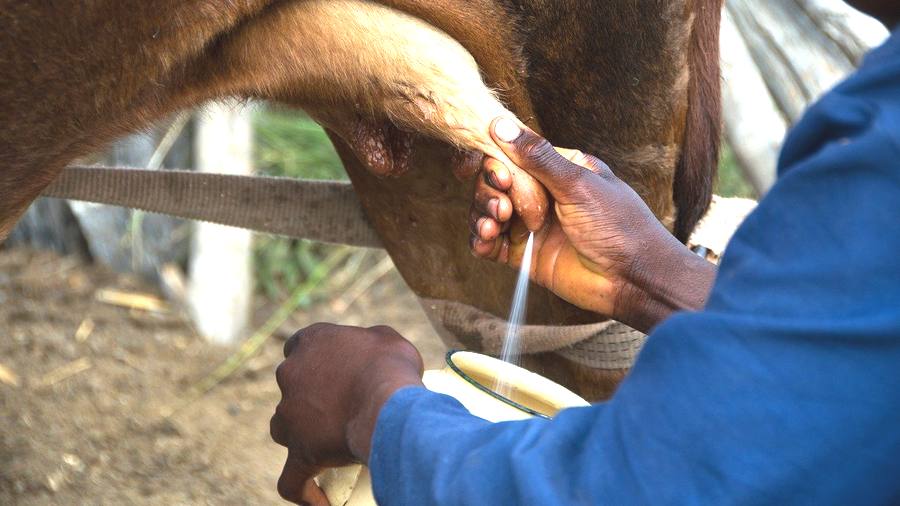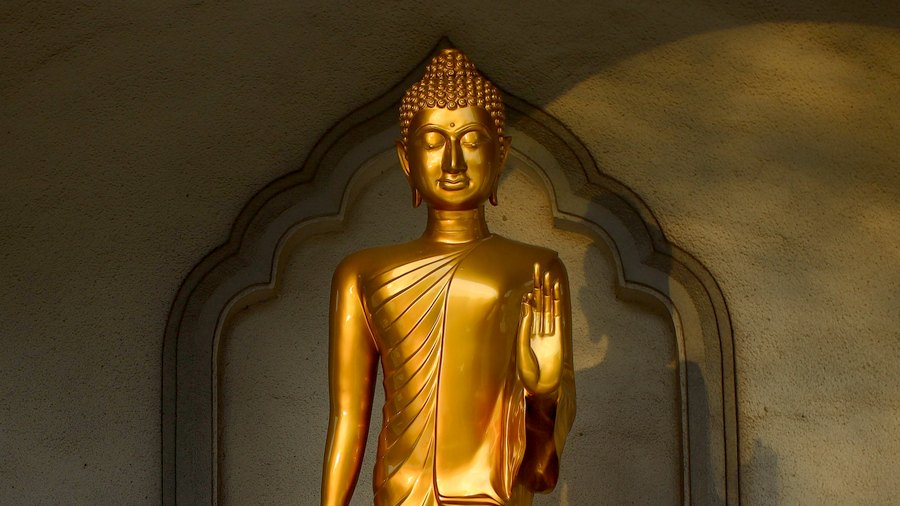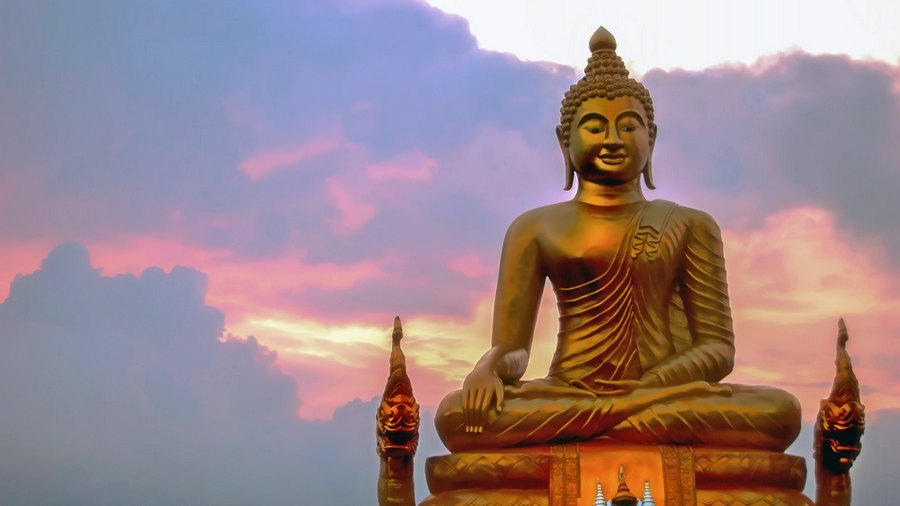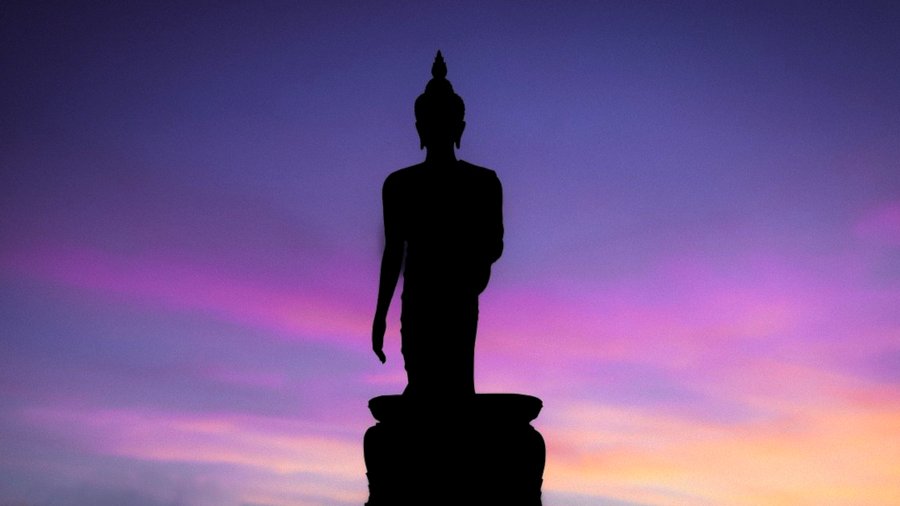[NOTE: Today’s sutta is a little bit longer (since it’s a weekend), but it is very important. The Buddha spells out how loving-kindness, along with the other brahmaviharas connect directly to the achievement of enlightenment through the seven enlightenment factors. There is a lot of repetition! If you find yourself unable to benefit from that, then at least scan the sutta looking for the structure of what the Buddha is saying. You also may not be familiar with all the terms either. That’s ok! Just take in what you can.]
On one occasion the Blessed One was dwelling among the Koliyans, where there was a town of the Koliyans named Haliddavasana. Then, in the morning, a number of bhikkhus dressed and, taking their bowls and robes, entered Haliddavasana for alms. Then it occurred to them: “It is still too early to walk for alms in Haliddavasana. Let us go to the park of the wanderers of other sects.”
Then those bhikkhus went to the park of the wanderers of other sects. They exchanged greetings with those wanderers and, when they had concluded their greetings and cordial talk, sat down to one side. The wanderers then said to them: “Friends, the ascetic Gotama teaches the Dhamma to his disciples thus: ‘Come, bhikkhus, abandon the five hindrances, the corruptions of the mind that weaken wisdom, and dwell pervading one quarter with a mind imbued with lovingkindness, likewise the second quarter, the third quarter, and the fourth quarter. Thus above, below, across, and everywhere, and to all as to oneself, dwell pervading the entire world with a mind imbued with lovingkindness, vast, exalted, measureless, without hostility, without ill will.
“Dwell pervading one quarter with a mind imbued with compassion, likewise the second quarter, the third quarter, and the fourth quarter. Thus above, below, across, and everywhere, and to all as to oneself, dwell pervading the entire world with a mind imbued with compassion, vast, exalted, measureless, without hostility, without ill will.
“Dwell pervading one quarter with a mind imbued with altruistic joy, likewise the second quarter, the third quarter, and the fourth quarter. Thus above, below, across, and everywhere, and to all as to oneself, dwell pervading the entire world with a mind imbued with altruistic joy, vast, exalted, measureless, without hostility, without ill will.
“Dwell pervading one quarter with a mind imbued with equanimity, likewise the second quarter, the third quarter, and the fourth quarter. Thus above, below, across, and everywhere, and to all as to oneself, dwell pervading the entire world with a mind imbued with equanimity, vast, exalted, measureless, without hostility, without ill will.’
“We too, friends, teach the Dhamma to our disciples thus: ‘Come, friends, abandon the five hindrances … all as above … dwell pervading the entire world with a mind imbued with lovingkindness … compassion … altruistic joy … equanimity … without ill will.’ So, friends, what here is the distinction, the disparity, the difference between the ascetic Gotama and us, that is, regarding the one Dhamma teaching and the other, regarding the one manner of instruction and the other?”
Then those bhikkhus neither delighted in nor rejected the statement of those wanderers. Without delighting in it, without rejecting it, they rose from their seats and left, thinking, “We shall learn the meaning of this statement in the presence of the Blessed One.”
Then, when those bhikkhus had walked for alms in Haliddavasana and had returned from the alms round, after their meal they approached the Blessed One. Having paid homage to him, they sat down to one side and reported to him the entire discussion between those wanderers and themselves. The Blessed One said:
“Bhikkhus, when wanderers of other sects speak thus, they should be asked: ‘Friends, how is the liberation of the mind by lovingkindness developed? What does it have as its destination, its culmination, its fruit, its final goal? How is the liberation of the mind by compassion developed? What does it have as its destination, its culmination, its fruit, its final goal? How is the liberation of the mind by altruistic joy developed? What does it have as its destination, its culmination, its fruit, its final goal? How is the liberation of the mind by equanimity developed? What does it have as its destination, its culmination, its fruit, its final goal?’
“Being asked thus, those wanderers would not be able to reply and, further, they would meet with vexation. For what reason? Because that would not be within their domain. I do not see anyone, bhikkhus, in this world with its devas, Mara, and Brahma, in this generation with its ascetics and brahmins, its devas and humans, who could satisfy the mind with an answer to these questions except the Tathagata or a disciple of the Tathagata or one who has heard it from them.
“And how, bhikkhus, is the liberation of the mind by lovingkindness developed? What does it have as its destination, its culmination, its fruit, its final goal? Here, bhikkhus, a bhikkhu develops the enlightenment factor of mindfulness accompanied by lovingkindness based upon seclusion, dispassion, and cessation, maturing in release. … the enlightenment factor of discrimination of states … the enlightenment factor of energy … the enlightenment factor of rapture … the enlightenment factor of tranquillity … the enlightenment factor of concentration … the enlightenment factor of equanimity accompanied by lovingkindness, based upon seclusion, dispassion, and cessation, maturing in release.
“If he wishes: ‘May I dwell perceiving the repulsive in the unrepulsive,’ he dwells perceiving the repulsive therein.
“If he wishes: ‘May I dwell perceiving the unrepulsive in the repulsive,’ he dwells perceiving the unrepulsive therein.
“If he wishes: ‘May I dwell perceiving the repulsive in the unrepulsive and in the repulsive,’ he dwells perceiving the repulsive therein.
“If he wishes: ‘May I dwell perceiving the unrepulsive in the repulsive and in the unrepulsive,’ he dwells perceiving the unrepulsive therein.
“If he wishes: ‘Avoiding both the unrepulsive and the repulsive, may I dwell equanimously, mindful and clearly comprehending,’ then he dwells therein equanimously, mindful and clearly comprehending.
“Or else he enters and dwells in the deliverance of the beautiful. Bhikkhus, the liberation of mind by lovingkindness has the beautiful as its culmination, I say, for a wise bhikkhu here who has not penetrated to a superior liberation.
“And how, bhikkhus, is the liberation of the mind by compassion developed? What does it have as its destination, its culmination, its fruit, its final goal? Here, bhikkhus, a bhikkhu develops the enlightenment factor of mindfulness accompanied by compassion … the enlightenment factor of equanimity accompanied by compassion, based upon seclusion, dispassion, and cessation, maturing in release. If he wishes: ‘May I dwell perceiving the repulsive in the unrepulsive,’ he dwells perceiving the repulsive therein…. If he wishes: ‘Avoiding both the unrepulsive and the repulsive, may I dwell equanimously, mindful and clearly comprehending,’ then he dwells therein equanimously, mindful and clearly comprehending.
“Or else, with the complete transcendence of perceptions of forms, with the passing away of perceptions of sensory impingement, with nonattention to perceptions of diversity, aware that ‘space is infinite,’ he enters and dwells in the base of the infinity of space. Bhikkhus, the liberation of mind by compassion has the base of the infinity of space as its culmination, I say, for a wise bhikkhu here who has not penetrated to a superior liberation.
“And how, bhikkhus, is the liberation of the mind by altruistic joy developed? What does it have as its destination, its culmination, its fruit, its final goal? Here, bhikkhus, a bhikkhu develops the enlightenment factor of mindfulness accompanied by altruistic joy … the enlightenment factor of equanimity accompanied by altruistic joy, based upon seclusion, dispassion, and cessation, maturing in release. If he wishes: ‘May I dwell perceiving the repulsive in the unrepulsive,’ he dwells perceiving the repulsive therein…. If he wishes: ‘Avoiding both the unrepulsive and the repulsive, may I dwell equanimously, mindful and clearly comprehending, ’ then he dwells therein equanimously, mindful and clearly comprehending.
“Or else, by completely transcending the base of the infinity of space, aware that ‘consciousness is infinite,’ he enters and dwells in the base of the infinity of consciousness. Bhikkhus, the liberation of mind by altruistic joy has the base of the infinity of consciousness as its culmination, I say, for a wise bhikkhu here who has not penetrated to a superior liberation.
“And how, bhikkhus, is the liberation of the mind by equanimity developed? What does it have as its destination, its culmination, its fruit, its final goal? Here, bhikkhus, a bhikkhu develops the enlightenment factor of mindfulness accompanied by equanimity … the enlightenment factor of equanimity accompanied by equanimity, based upon seclusion, dispassion, and cessation, maturing in release. If he wishes: ‘May I dwell perceiving the repulsive in the unrepulsive,’ he dwells perceiving the repulsive therein…. If he wishes: ‘Avoiding both the unrepulsive and the repulsive, may I dwell equanimously, mindful and clearly comprehending,’ then he dwells therein equanimously, mindful and clearly comprehending.
“Or else, by completely transcending the base of the infinity of consciousness, aware that ‘there is nothing,’ he enters and dwells in the base of nothingness. Bhikkhus, the liberation of mind by equanimity has the base of nothingness as its culmination, I say, for a wise bhikkhu here who has not penetrated to a superior liberation.”
Read this translation of Saṁyutta Nikāya 46.54 Mettāsahagatasutta: Accompanied by Lovingkindness by Bhikkhu Bodhi on SuttaCentral.net. Or read a different translation on SuttaCentral.net or DhammaTalks.org. Or listen on SC-Voice.net. Or explore the Pali on DigitalPaliReader.online.






























